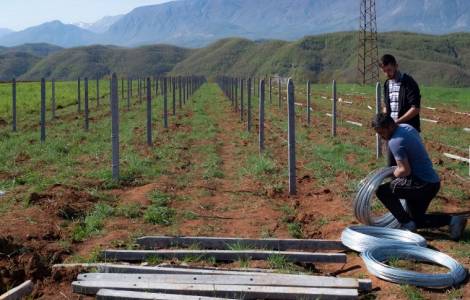
Rreshen (Agenzia Fides) - "It was difficult to bring people closer to the project: there was a lot of mistrust, almost no one believed that we could bring water for irrigation to the Shkors plain", says Gentian, local formator of the Movement Fight World Hunger, in the Diocese of Rreshen, north-east of Albania.
The project he refers to aims to contribute to the improvement of the quality of life and the economic inclusion of vulnerable families residing in the Municipalities of Klos and Mat, to reduce travel, especially for fathers and young people outside the Country. "The public drinking water network arrived here only in 2019 - continues Gentian. We started working on this project in December 2020. Until a few months ago this area had access to water but only for the agricultural purposes of large companies, without families being able to use it for the irrigation of their lands or for domestic use".
The Mat Valley is located in the north east of Albania and is one of the four regions that make up the Diocese of Rrëshen, a suffragan of the archdiocese of Tirana-Durres, located along the road leading to the Macedonian border. The territory is mainly made up of a wide valley where small villages of people dedicated to family subsistence agriculture develop, which are very simple and lacking in skills and tools suitable for market production. "This land is in fact as luxuriant as it is inhospitable and difficult for its inhabitants. Natural resources are actually many, but very few can use them". The MLFM co-worker claims that since the project started about 9 months ago, changes are starting to show. "This is a very important sign, a sign of hope for Albania and in particular for the Mat Valley".
Here the conditions of social, educational and economic exclusion are widespread: the inland areas, unlike the coastal ones, suffer from high levels of unemployment and significant lack of infrastructures and services, especially in the field of transport, treatment and water supply in all villages and waste management. The project, divided into three years, provides professional training and support for the development of market-oriented agri-food production activities for 162 families in the area, to encourage employment in the area and discourage emigration outside the country. The organization of a new nursery and a vineyard is also planned; the construction of a gravity aqueduct with storage of water from the surrounding mountains, usable for human and not only agricultural use, as has been the case until now.
The aqueduct, in particular, involves the construction and positioning of 7 kilometers of pipes and the creation of a water deposit; the installation of a water deposit of 200 m3 for the subsequent distribution of water and the strengthening of an already active family dairy that processes cow milk from 42 local families to improve the possibilities of generating income for peasant families. (AP) (Agenzia Fides, 8/10/2021)